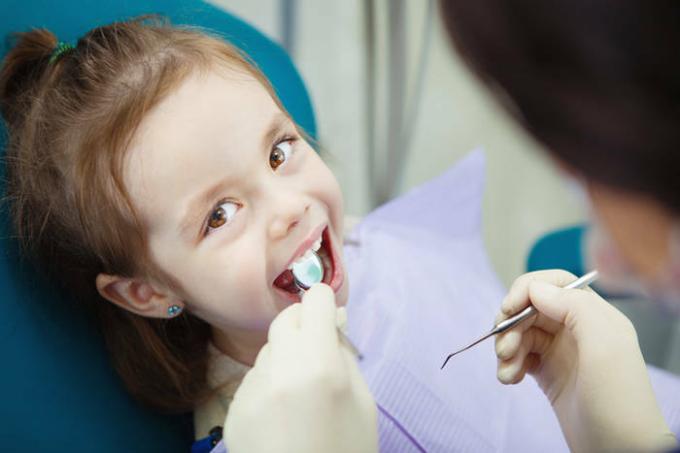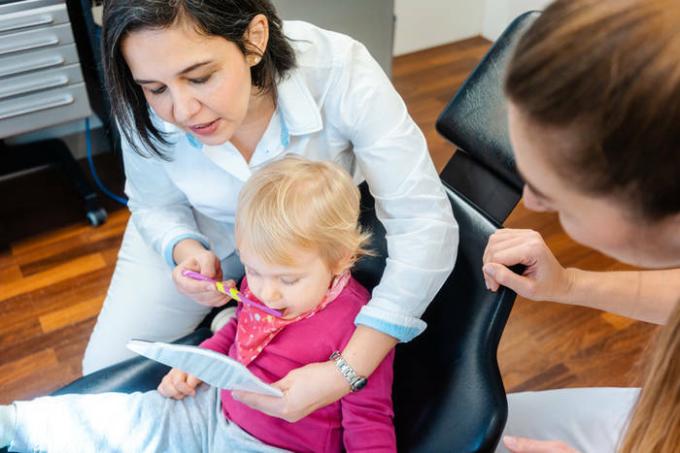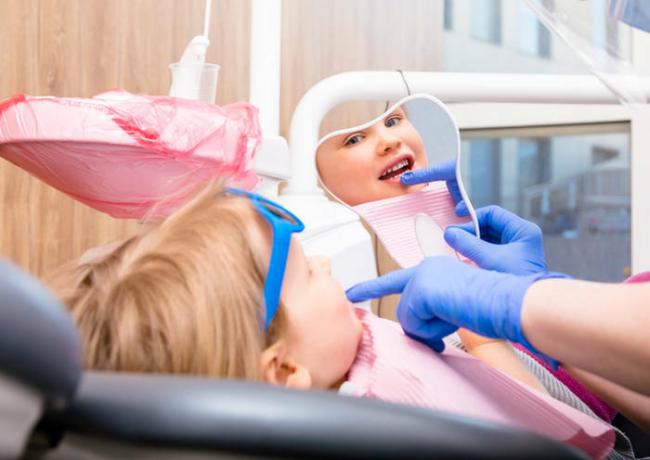What actions of adults bring up in children anxiety about dentists?
Here are the most common mistakes parents make when treating their teeth.
The child is taken to the dentist when something already hurts
When a child has a toothache, he is afraid of any outside interference in the oral cavity like fire. Starting at this time with the dentist is the worst of the options.
The child should get used to the doctor in advance, to know that visiting the doctor may be a little uncomfortable, but it happens regularly and does not bring pain.
If an unfamiliar uncle with a buzzing dental machine crawls into the mouth of a child who is experiencing a toothache for the first time in his life, then a panic fear of the dentist is guaranteed.
The first visit to the dentist can be made as early as 8-12 months, when the teeth appeared. The more regular visits to the dentist are, the less likely the child will be very afraid of him.
It is important to find a clinic where they work with children. The best doctor who can persuade a child to sit quietly in a chair is easiest to find from reviews from other parents.

Treatment violence
It seems that there are only two ways to cure a child's teeth: either he gives it to be done voluntarily, or he is held by force. And the second happens, unfortunately, often.
Parents shrug their shoulders: what to do, it is necessary to treat.
First, you must always act on warning. Examine and treat before the situation has become so critical that there is no time to persuade.
Secondly, to conduct psychological preparation of the child for treatment even before entering the doctor's office. Talk, explain (repeatedly and calmly), motivate, play at home in the dentist (in the role of a patient, then a child, then parents, then toys), adults - go to the dentist themselves and show the child that this is not scary and routine procedure.
Thirdly, if the moment is missed, the child has already been forcibly held and he panics at the mere mention of the dentist - work with a psychologist is needed.Yes, oddly enough, you need to work with a psychologist not only for some complex mental trauma, but also for such fears. In any case, violence and threats will definitely not make your child healthier or teach him how to properly manage his dental health.
Fourth, many clinics offer treatment for children under general anesthesia. It does not last long and is generally safe. If a child's teeth need to be treated immediately, then this is an emergency solution. And then all the same you need persuasion and study of fears.

Limited and inconvenient time for the child to visit the doctor
In order for a child to go to negotiations and be more flexible and patient, he must be "in the resource." That is, not tired, slept, focused on the game and communication.
To do this, a trip to the dentist should not fall out in the early morning, late evening, lunchtime. Also, there is no need to lead to a denture when the child suffers from other diseases: cough, runny nose, fever or any other illness.
Before admission, the child needs to get used to the place, play, watch cartoons, get comfortable, talk to a doctor - therefore, you always need to come in advance, do not rush, do not rush the child.

Parents promise that the child "will not do anything"
To say that nothing will be done to the child at all is always deceiving. At a minimum, the doctor will examine the teeth, for this you will have to sit in a chair, keep your mouth wide open, the doctor will use tools - and this is no longer "doing nothing."
Moreover, how to explain to a child why go to the doctor at all, if nothing will be done?
To deceive a child in such cases is definitely to undermine his trust. Once he will behave - and the second time no longer. And if the parents are cheating, then who should you believe at all?
Tell your child directly that the doctor will look at the teeth, and if necessary, he will treat a little. Do not use the words "drill", "pull out", "prick", "blood", "hurt", etc.
If the teeth are treated, the child should be warned about it. If you have promised that there will be only an examination - keep your promise and do not start treatment on this visit.You can tell that a child will not want to go to the doctor if you tell him directly about the treatment. Yes maybe. But the parent's task is not to drag it to the doctor by any effort - and then let the dentist handle it himself. The parent's task is to prepare the child, motivate, negotiate, persuade to take care of dental health.
This task cannot be solved in one go and one conversation. It should be constant, regular work, constantly talking about the importance of dental health.
And the dentist, by the way, may well simply refuse you treatment and examination if the child is not properly prepared. The doctor is not a magician or a psychologist, his task is to treat teeth.

Wrong motivation
How to motivate a child to do something that he does not want? Of course, to promise a reward - a toy, sweets, entertainment.
But in health matters it doesn't work that way.
First, because the fear of medical intervention is always stronger than the desire to get a toy or sweetness (by the way, do not try to promise sweet things in the dentist's office, especially if the child has sick teeth). Think, will the promise of some trinket be your motivation to treat your teeth? Probably not.
Secondly, if "motivation" works, then the child will demand more and more each time. And then it won't even get up from the couch, if you don't promise a gift.Then how is it correct? Health itself should be the motivation. Such an abstract phenomenon is still not very clear to a small child, especially if he practically has not encountered any diseases.
But you still need to explain the importance of health. Talk about microbes that stain teeth and can make a hole, and an uncle dentist will clean the teeth from germs and close the hole so that the teeth do not hurt. For each age, there should be explanations that are understandable to a particular child.
You can't find the words - instructive books and cartoons about doctors will help you.
And most importantly, never scare a child with a doctor and do not threaten with treatment, injections, ambulance, etc. Create in your child the most positive image of any doctor as a person who helps to feel better and be healthy, rather than torturing and punishing "bad behavior".
You will also be interested to read:
- 7 dentist tips on how to clean your children's teeth
- How dentists deceive us - 4 main cases
- 5 important facts about childhood tooth decay that parents forget about

